Decreasing Gout Risk
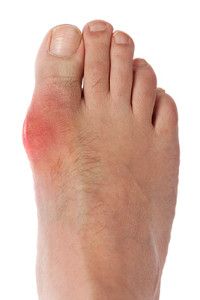 Gout is one of the most painful forms of arthritis, commonly affecting those aged 60 and higher. Associated with high levels of uric acid, gout is typically characterized by pain and redness in the joints. Many health professionals agree that gout risk can be lowered by managing one’s diet, which involves reducing foods and drinks high in purine from one’s food intake. These foods include alcohol, red meat, organ meat such as liver or kidney, certain seafoods, drinks high in fructose, and processed foods. Lowering one’s uric acid levels is key in reducing gout risk.
Gout is one of the most painful forms of arthritis, commonly affecting those aged 60 and higher. Associated with high levels of uric acid, gout is typically characterized by pain and redness in the joints. Many health professionals agree that gout risk can be lowered by managing one’s diet, which involves reducing foods and drinks high in purine from one’s food intake. These foods include alcohol, red meat, organ meat such as liver or kidney, certain seafoods, drinks high in fructose, and processed foods. Lowering one’s uric acid levels is key in reducing gout risk.
Gout is a foot condition that requires certain treatment and care. If you are seeking treatment, contact Donald Manger, DPM from Associated Podiatric Physicians, PA. Our doctor will treat your foot and ankle needs.
What Is Gout?
Gout is a type of arthritis caused by a buildup of uric acid in the bloodstream. It often develops in the foot, especially the big toe area, although it can manifest in other parts of the body as well. Gout can make walking and standing very painful and is especially common in diabetics and the obese.
People typically get gout because of a poor diet. Genetic predisposition is also a factor. The children of parents who have had gout frequently have a chance of developing it themselves.
Gout can easily be identified by redness and inflammation of the big toe and the surrounding areas of the foot. Other symptoms include extreme fatigue, joint pain, and running high fevers. Sometimes corticosteroid drugs can be prescribed to treat gout, but the best way to combat this disease is to get more exercise and eat a better diet.
If you have any questions please feel free to contact our office located in Hamilton Township, NJ . We offer the newest diagnostic and treatment technologies for all your foot and ankle needs.
Plantar Fasciitis Common Among Adults
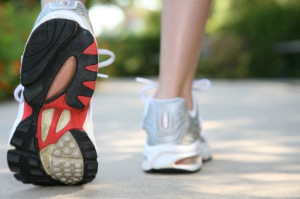 Plantar fasciitis is a foot condition that most commonly affects those between the ages of 30 to 55, especially those who are athletes. The plantar fascia, a ligament that runs beneath the sole of the foot, supports the arch of the foot and acts as a shock absorber. Repeated stress and impact to the heel, however, can cause the fascia to tear and become inflamed. This results in the foot condition, plantar fasciitis. While there are various specific causes of this condition, excessive pressure is often the culprit. To determine the cause of your plantar fasciitis and the most appropriate treatment, consult with your podiatrist.
Plantar fasciitis is a foot condition that most commonly affects those between the ages of 30 to 55, especially those who are athletes. The plantar fascia, a ligament that runs beneath the sole of the foot, supports the arch of the foot and acts as a shock absorber. Repeated stress and impact to the heel, however, can cause the fascia to tear and become inflamed. This results in the foot condition, plantar fasciitis. While there are various specific causes of this condition, excessive pressure is often the culprit. To determine the cause of your plantar fasciitis and the most appropriate treatment, consult with your podiatrist.
Plantar fasciitis can be very painful and inconvenient. If you are experiencing heel pain or symptoms of plantar fasciitis, contact the podiatrists from Associated Podiatric Physicians, PA. Our doctors can provide the care you need to keep you pain-free and on your feet.
What Is Plantar Fasciitis?
Plantar fasciitis is the inflammation of the thick band of tissue that runs along the bottom of your foot, known as the plantar fascia, and causes mild to severe heel pain.
What Causes Plantar Fasciitis?
- Excessive running
- Non-supportive shoes
- Overpronation
- Repeated stretching and tearing of the plantar fascia
How Can It Be Treated?
- Conservative measures – anti-inflammatories, ice packs, stretching exercises, physical therapy, orthotic devices
- Shockwave therapy – sound waves are sent to the affected area to facilitate healing and are usually used for chronic cases of plantar fasciitis
- Surgery – usually only used as a last resort when all else fails. The plantar fascia can be surgically detached from the heel
While very treatable, plantar fasciitis is definitely not something that should be ignored. Especially in severe cases, speaking to your doctor right away is highly recommended to avoid complications and severe heel pain. Your podiatrist can work with you to provide the appropriate treatment options tailored to your condition.
If you have any questions please feel free to contact our office located in Hamilton Township, NJ. We offer the newest diagnostic and treatment technologies for all your foot and ankle needs.
Read more about Plantar FasciitisPlantar Fasciitis Common Among Adults
 Plantar fasciitis is a foot condition that most commonly affects those between the ages of 30 to 55, especially those who are athletes. The plantar fascia, a ligament that runs beneath the sole of the foot, supports the arch of the foot and acts as a shock absorber. Repeated stress and impact to the heel, however, can cause the fascia to tear and become inflamed. This results in the foot condition, plantar fasciitis. While there are various specific causes of this condition, excessive pressure is often the culprit. To determine the cause of your plantar fasciitis and the most appropriate treatment, consult with your podiatrist.
Plantar fasciitis is a foot condition that most commonly affects those between the ages of 30 to 55, especially those who are athletes. The plantar fascia, a ligament that runs beneath the sole of the foot, supports the arch of the foot and acts as a shock absorber. Repeated stress and impact to the heel, however, can cause the fascia to tear and become inflamed. This results in the foot condition, plantar fasciitis. While there are various specific causes of this condition, excessive pressure is often the culprit. To determine the cause of your plantar fasciitis and the most appropriate treatment, consult with your podiatrist.
Plantar fasciitis can be very painful and inconvenient. If you are experiencing heel pain or symptoms of plantar fasciitis, contact Donald Manger, DPM from Associated Podiatric Physicians, PA. Our doctor can provide the care you need to keep you pain-free and on your feet.
What Is Plantar Fasciitis?
Plantar fasciitis is the inflammation of the thick band of tissue that runs along the bottom of your foot, known as the plantar fascia, and causes mild to severe heel pain.
What Causes Plantar Fasciitis?
- Excessive running
- Non-supportive shoes
- Overpronation
- Repeated stretching and tearing of the plantar fascia
How Can It Be Treated?
- Conservative measures – anti-inflammatories, ice packs, stretching exercises, physical therapy, orthotic devices
- Shockwave therapy – sound waves are sent to the affected area to facilitate healing and are usually used for chronic cases of plantar fasciitis
- Surgery – usually only used as a last resort when all else fails. The plantar fascia can be surgically detached from the heel
While very treatable, plantar fasciitis is definitely not something that should be ignored. Especially in severe cases, speaking to your doctor right away is highly recommended to avoid complications and severe heel pain. Your podiatrist can work with you to provide the appropriate treatment options tailored to your condition.
If you have any questions please feel free to contact our office located in Hamilton Township, NJ . We offer the newest diagnostic and treatment technologies for all your foot and ankle needs.
The push for work-friendly high heels
 High heels have long held the stigma of being uncomfortable and unconventional for daily wear and for work. Health risks such as nerve damage, early arthritis, and long-term joint pain all come with long-term wear. Emerging business women, however, are looking to turn that notion around and develop high heels that do not damage the feet as much. Dolly Singh, CEO of a footwear company, is collaborating with designer Julia Thomas to create an office-friendly collection. When starting her brand, Singh recruited rocket scientists from SpaceX, along with a number of engineers to develop shoes. Her new collection will reportedly reduce the amount of pressure typically placed on the toes and the balls of the feet, using aerospace-grade foam and redesigned heels.
High heels have long held the stigma of being uncomfortable and unconventional for daily wear and for work. Health risks such as nerve damage, early arthritis, and long-term joint pain all come with long-term wear. Emerging business women, however, are looking to turn that notion around and develop high heels that do not damage the feet as much. Dolly Singh, CEO of a footwear company, is collaborating with designer Julia Thomas to create an office-friendly collection. When starting her brand, Singh recruited rocket scientists from SpaceX, along with a number of engineers to develop shoes. Her new collection will reportedly reduce the amount of pressure typically placed on the toes and the balls of the feet, using aerospace-grade foam and redesigned heels.
High heels have a history of causing foot and ankle problems. If you have any concerns about your feet or ankles, contact the podiatrists from Associated Podiatric Physicians, PA. Our doctors can provide the care you need to keep you pain-free and on your feet.
Effects of High Heels on the Feet
High heels are popular shoes among women because of their many styles and societal appeal. Despite this, high heels can still cause many health problems if worn too frequently.
Which Parts of My Body Will Be Affected by High Heels?
- Ankle Joints
- Achilles Tendon – May shorten and stiffen with prolonged wear
- Balls of the Feet
- Knees – Heels cause the knees to bend constantly, creating stress on them
- Back – They decrease the spine’s ability to absorb shock, which may lead to back pain. The vertebrae of the lower back may compress.
What Kinds of Foot Problems Can Develop from Wearing High Heels?
- Corns
- Calluses
- Hammertoe
- Bunions
- Morton’s Neuroma
- Plantar Fasciitis
How Can I Still Wear High Heels and Maintain Foot Health?
If you want to wear high heeled shoes, make sure that you are not wearing them every day, as this will help prevent long term physical problems. Try wearing thicker heels as opposed to stilettos to distribute weight more evenly across the feet. Always make sure you are wearing the proper shoes for the right occasion, such as sneakers for exercising. If you walk to work, try carrying your heels with you and changing into them once you arrive at work. Adding inserts to your heels can help cushion your feet and absorb shock. Full foot inserts or metatarsal pads are available.
If you have any questions please feel free to contact our office located in Hamilton Township, NJ. We offer the newest diagnostic and treatment technologies for all your foot and ankle needs.
Read more about Effect of High Heels on the FeetThe push for work-friendly high heels
 High heels have long held the stigma of being uncomfortable and unconventional for daily wear and for work. Health risks such as nerve damage, early arthritis, and long-term joint pain all come with long-term wear. Emerging business women, however, are looking to turn that notion around and develop high heels that do not damage the feet as much. Dolly Singh, CEO of a footwear company, is collaborating with designer Julia Thomas to create an office-friendly collection. When starting her brand, Singh recruited rocket scientists from SpaceX, along with a number of engineers to develop shoes. Her new collection will reportedly reduce the amount of pressure typically placed on the toes and the balls of the feet, using aerospace-grade foam and redesigned heels.
High heels have long held the stigma of being uncomfortable and unconventional for daily wear and for work. Health risks such as nerve damage, early arthritis, and long-term joint pain all come with long-term wear. Emerging business women, however, are looking to turn that notion around and develop high heels that do not damage the feet as much. Dolly Singh, CEO of a footwear company, is collaborating with designer Julia Thomas to create an office-friendly collection. When starting her brand, Singh recruited rocket scientists from SpaceX, along with a number of engineers to develop shoes. Her new collection will reportedly reduce the amount of pressure typically placed on the toes and the balls of the feet, using aerospace-grade foam and redesigned heels.
High heels have a history of causing foot and ankle problems. If you have any concerns about your feet or ankles, contact Donald Manger, DPM from Associated Podiatric Physicians, PA. Our doctor can provide the care you need to keep you pain-free and on your feet.
Effects of High Heels on the Feet
High heels are popular shoes among women because of their many styles and societal appeal. Despite this, high heels can still cause many health problems if worn too frequently.
Which Parts of My Body Will Be Affected by High Heels?
- Ankle Joints
- Achilles Tendon – May shorten and stiffen with prolonged wear
- Balls of the Feet
- Knees – Heels cause the knees to bend constantly, creating stress on them
- Back – They decrease the spine’s ability to absorb shock, which may lead to back pain. The vertebrae of the lower back may compress.
What Kinds of Foot Problems Can Develop from Wearing High Heels?
- Corns
- Calluses
- Hammertoe
- Bunions
- Morton’s Neuroma
- Plantar Fasciitis
How Can I Still Wear High Heels and Maintain Foot Health?
If you want to wear high heeled shoes, make sure that you are not wearing them every day, as this will help prevent long term physical problems. Try wearing thicker heels as opposed to stilettos to distribute weight more evenly across the feet. Always make sure you are wearing the proper shoes for the right occasion, such as sneakers for exercising. If you walk to work, try carrying your heels with you and changing into them once you arrive at work. Adding inserts to your heels can help cushion your feet and absorb shock. Full foot inserts or metatarsal pads are available.
If you have any questions please feel free to contact our office located in Hamilton Township, NJ . We offer the newest diagnostic and treatment technologies for all your foot and ankle needs.
Bulls’ Payne again suffers foot injury
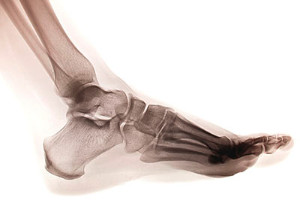 Chicago Bulls' guard Cameron Payne, since being traded from the Oklahoma Thunder last year, is still having right foot problems. Last summer Payne was having pain in his foot, which eventually led to stress fracture surgery. Since the surgery Payne’s foot has been on the fritz. In training camp, he aggravated the surgical screw in his foot. Though he didn’t have a second surgery after this incident, the pain had lingered. Being that Payne has only been with the Bulls since February 23, he has been working overtime learning the offense. The pain has returned and now he’s back on the bench. In his own words, “I just need to take a little time off it.”
Chicago Bulls' guard Cameron Payne, since being traded from the Oklahoma Thunder last year, is still having right foot problems. Last summer Payne was having pain in his foot, which eventually led to stress fracture surgery. Since the surgery Payne’s foot has been on the fritz. In training camp, he aggravated the surgical screw in his foot. Though he didn’t have a second surgery after this incident, the pain had lingered. Being that Payne has only been with the Bulls since February 23, he has been working overtime learning the offense. The pain has returned and now he’s back on the bench. In his own words, “I just need to take a little time off it.”
Activities where too much pressure is put on the feet can cause stress fractures. To learn more, contact the podiatrists from Associated Podiatric Physicians, PA. Our doctors can provide the care you need to keep your pain free and on your feet.
Dealing with Stress Fractures of the Foot and Ankle
Stress fractures occur in the foot and ankle when muscles in these areas weaken from too much or too little use. The feet and ankles then lose support when walking or running from the impact of the ground. Since there is no protection, the bones receive the full impact of each step. Stress on the feet can cause cracks to form in the bones, thus creating stress fractures.
What Are Stress Fractures?
Stress fractures occur frequently in individuals whose daily activities cause great impact on the feet and ankles. Stress factors are most common among:
- Runners
- People affected with Osteoporosis
- Tennis or basketball players
- Gymnasts
- High impact workouts
Symptoms
Pain from the fractures occur in the area of the fractures and can be constant or intermittent. It will often cause sharp or dull pain with swelling and tenderness. Engaging in any kind of activity which involves high impact will aggravate pain.
If you have any questions please feel free to contact our office located in Hamilton Township, NJ. We offer the newest diagnostic and treatment technologies for all your foot and ankle needs.
Read more about Dealing with Stress Fractures of the Foot and AnkleCauses of Heel Pain
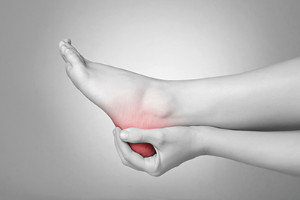 Heel pain is a condition that plagues many people, and chronic cases can be especially difficult to endure. For many common cases of chronic heel pain, plantar fasciitis is the underlying culprit; plantar fasciitis affects all types of people, though most commonly active men between the ages of 40 and 70. Plantar fasciitis pain manifests in various ways. For some people, it can be described as dull; in other cases, people feel it as a sharp pain, a burning sensation, or an ache that extends outward from the heel. There are various factors that can contribute to plantar fasciitis. To determine the cause of your heel pain and the best way to treat it, consult with your podiatrist.
Heel pain is a condition that plagues many people, and chronic cases can be especially difficult to endure. For many common cases of chronic heel pain, plantar fasciitis is the underlying culprit; plantar fasciitis affects all types of people, though most commonly active men between the ages of 40 and 70. Plantar fasciitis pain manifests in various ways. For some people, it can be described as dull; in other cases, people feel it as a sharp pain, a burning sensation, or an ache that extends outward from the heel. There are various factors that can contribute to plantar fasciitis. To determine the cause of your heel pain and the best way to treat it, consult with your podiatrist.
Many people suffer from bouts of heel pain. For more information, contact the podiatrists of Associated Podiatric Physicians, PA. Our doctors can provide the care you need to keep you pain-free and on your feet.
Causes of Heel Pain
Heel pain is often associated with plantar fasciitis. The plantar fascia is a band of tissues that extends along the bottom of the foot. A rip or tear in this ligament can cause inflammation of the tissue.
Achilles tendonitis is another cause of heel pain. Inflammation of the Achilles tendon will cause pain from fractures and muscle tearing. Lack of flexibility is also another symptom.
Heel spurs are another cause of pain. When the tissues of the plantar fascia undergo a great deal of stress, it can lead to ligament separation from the heel bone, causing heel spurs.
Why Might Heel Pain Occur?
- Wearing ill-fitting shoes
- Wearing non-supportive shoes
- Weight change
- Excessive running
Treatments
Heel pain should be treated as soon as possible for immediate results. Keeping your feet in a stress-free environment will help. If you suffer from Achilles tendonitis or plantar fasciitis, applying ice will reduce the swelling. Stretching before an exercise like running will help the muscles. Using all these tips will help make heel pain a condition of the past.
If you have any questions please contact our office located in Hamilton Township, NJ. We offer the newest diagnostic and treatment technologies for all your foot and ankle needs.
Read more about Heel PainCauses of Heel Pain
 Heel pain is a condition that plagues many people, and chronic cases can be especially difficult to endure. For many common cases of chronic heel pain, plantar fasciitis is the underlying culprit; plantar fasciitis affects all types of people, though most commonly active men between the ages of 40 and 70. Plantar fasciitis pain manifests in various ways. For some people, it can be described as dull; in other cases, people feel it as a sharp pain, a burning sensation, or an ache that extends outward from the heel. There are various factors that can contribute to plantar fasciitis. To determine the cause of your heel pain and the best way to treat it, consult with your podiatrist.
Heel pain is a condition that plagues many people, and chronic cases can be especially difficult to endure. For many common cases of chronic heel pain, plantar fasciitis is the underlying culprit; plantar fasciitis affects all types of people, though most commonly active men between the ages of 40 and 70. Plantar fasciitis pain manifests in various ways. For some people, it can be described as dull; in other cases, people feel it as a sharp pain, a burning sensation, or an ache that extends outward from the heel. There are various factors that can contribute to plantar fasciitis. To determine the cause of your heel pain and the best way to treat it, consult with your podiatrist.
Many people suffer from bouts of heel pain. For more information, contact Donald Manger, DPM of Associated Podiatric Physicians, PA. Our doctor can provide the care you need to keep you pain-free and on your feet.
Causes of Heel Pain
Heel pain is often associated with plantar fasciitis. The plantar fascia is a band of tissues that extends along the bottom of the foot. A rip or tear in this ligament can cause inflammation of the tissue.
Achilles tendonitis is another cause of heel pain. Inflammation of the Achilles tendon will cause pain from fractures and muscle tearing. Lack of flexibility is also another symptom.
Heel spurs are another cause of pain. When the tissues of the plantar fascia undergo a great deal of stress, it can lead to ligament separation from the heel bone, causing heel spurs.
Why Might Heel Pain Occur?
- Wearing ill-fitting shoes
- Wearing non-supportive shoes
- Weight change
- Excessive running
Treatments
Heel pain should be treated as soon as possible for immediate results. Keeping your feet in a stress-free environment will help. If you suffer from Achilles tendonitis or plantar fasciitis, applying ice will reduce the swelling. Stretching before an exercise like running will help the muscles. Using all these tips will help make heel pain a condition of the past.
If you have any questions please contact our office located in Hamilton Township, NJ . We offer the newest diagnostic and treatment technologies for all your foot and ankle needs.
Study Finds Link Between Weight and Level of Foot Pain
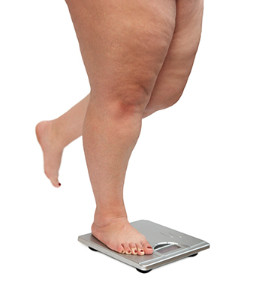 According to findings presented at the American College of Rheumatology Annual Meeting, patients with higher weights are more susceptible to foot pain. Instructor of Medicine Alyssa B. Dufour of Harvard Medical School and her colleagues studied 28 different measures over 57 years to identify the trajectories of weight in the Framingham Foot Study. After five such trajectories were established, patterns began to develop that showed a correlation between higher weight over time and higher levels of foot pain.
According to findings presented at the American College of Rheumatology Annual Meeting, patients with higher weights are more susceptible to foot pain. Instructor of Medicine Alyssa B. Dufour of Harvard Medical School and her colleagues studied 28 different measures over 57 years to identify the trajectories of weight in the Framingham Foot Study. After five such trajectories were established, patterns began to develop that showed a correlation between higher weight over time and higher levels of foot pain.
Obesity has become very problematic at this point in time and can have extremely negative effects on the feet. If you’re an obese individual and are concerned about your feet, contact the podiatrists from Associated Podiatric Physicians, PA. Our doctors can provide the care you need to keep you pain-free and on your feet.
Obesity and Your Feet
Since your feet are what support your entire weight when standing, any additional weight can result in pain and swelling. Being overweight is one of the main contributors to foot complications.
Problems & Complications
Extra Weight – Even putting on just a few extra pounds could create serious complications for your feet. As your weight increases, your balance and body will shift, creating new stresses on your feet. This uneven weight distribution can cause pain, even while doing the simplest tasks, such as walking.
Diabetes – People who are overweight are at serious risk of developing type-2 diabetes, which has a drastic impact on the health of your feet. As you get older, your diabetes might worsen, which could lead to loss of feeling in your feet, sores, and bruises. You could also become more prone to various infections.
Plantar fasciitis – Pressure and stress that is placed on muscles, joints, and tendons can trigger plantar fasciitis, which is an inflammation of tissue that forms along the bottom of the foot.
If you have any questions please feel free to contact our office located in Hamilton Township, NJ. We offer the newest diagnostic and treatment technologies for all your foot and ankle needs.
Read more about How Obesity Affects Your FeetStudy Finds Link Between Weight and Level of Foot Pain
 According to findings presented at the American College of Rheumatology Annual Meeting, patients with higher weights are more susceptible to foot pain. Instructor of Medicine Alyssa B. Dufour of Harvard Medical School and her colleagues studied 28 different measures over 57 years to identify the trajectories of weight in the Framingham Foot Study. After five such trajectories were established, patterns began to develop that showed a correlation between higher weight over time and higher levels of foot pain.
According to findings presented at the American College of Rheumatology Annual Meeting, patients with higher weights are more susceptible to foot pain. Instructor of Medicine Alyssa B. Dufour of Harvard Medical School and her colleagues studied 28 different measures over 57 years to identify the trajectories of weight in the Framingham Foot Study. After five such trajectories were established, patterns began to develop that showed a correlation between higher weight over time and higher levels of foot pain.
Obesity has become very problematic at this point in time and can have extremely negative effects on the feet. If you’re an obese individual and are concerned about your feet, contact Donald Manger, DPM from Associated Podiatric Physicians, PA. Our doctor can provide the care you need to keep you pain-free and on your feet.
Obesity and Your Feet
Since your feet are what support your entire weight when standing, any additional weight can result in pain and swelling. Being overweight is one of the main contributors to foot complications.
Problems & Complications
Extra Weight – Even putting on just a few extra pounds could create serious complications for your feet. As your weight increases, your balance and body will shift, creating new stresses on your feet. This uneven weight distribution can cause pain, even while doing the simplest tasks, such as walking.
Diabetes – People who are overweight are at serious risk of developing type-2 diabetes, which has a drastic impact on the health of your feet. As you get older, your diabetes might worsen, which could lead to loss of feeling in your feet, sores, and bruises. You could also become more prone to various infections.
Plantar fasciitis – Pressure and stress that is placed on muscles, joints, and tendons can trigger plantar fasciitis, which is an inflammation of tissue that forms along the bottom of the foot.
If you have any questions please feel free to contact our office located in Hamilton Township, NJ . We offer the newest diagnostic and treatment technologies for all your foot and ankle needs.
More...
Understanding Hammertoes
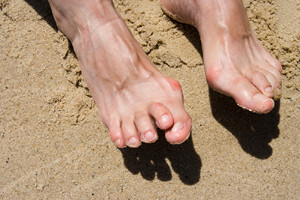 If you have hammertoes, it may be due to a number of factors including improperly-fitting shoes or muscle and nerve diseases that can affect your feet. Hammertoes are described as bent and curled toes, seeming to resemble the claw of a hammer. The condition is permanent and may require treatment if pain progresses. Typical treatment includes wearing the proper footwear and physical therapy. A final option is surgery for severe cases, but consulting with your podiatrist first about your condition is recommended before deciding on the surgical option.
If you have hammertoes, it may be due to a number of factors including improperly-fitting shoes or muscle and nerve diseases that can affect your feet. Hammertoes are described as bent and curled toes, seeming to resemble the claw of a hammer. The condition is permanent and may require treatment if pain progresses. Typical treatment includes wearing the proper footwear and physical therapy. A final option is surgery for severe cases, but consulting with your podiatrist first about your condition is recommended before deciding on the surgical option.
Hammertoe
Hammertoes can be a painful condition to live with. For more information, contact the podiatrists from Associated Podiatric Physicians, PA. Our doctors will answer any of your foot- and ankle-related questions.
Hammertoe is a foot deformity that affects the joints of the second, third, fourth, or fifth toes of your feet. It is a painful foot condition in which these toes curl and arch up, which can often lead to pain when wearing footwear.
Symptoms
- Pain in the affected toes
- Development of corns or calluses due to friction
- Inflammation
- Redness
- Contracture of the toes
Causes
Genetics – People who are genetically predisposed to hammertoe are often more susceptible
Arthritis – Because arthritis affects the joints in your toes, further deformities stemming from arthritis can occur
Trauma – Direct trauma to the toes could potentially lead to hammertoe
Ill-fitting shoes – Undue pressure on the front of the toes from ill-fitting shoes can potentially lead to the development of hammertoe
Treatment
Orthotics – Custom made inserts can be used to help relieve pressure placed on the toes and therefore relieve some of the pain associated with it
Medications – Oral medications such as anti-inflammatories or NSAIDs could be used to treat the pain and inflammation hammertoes causes. Injections of corticosteroids are also sometimes used
Surgery – In more severe cases where the hammertoes have become more rigid, foot surgery is a potential option
If you have any questions please contact our office located in Hamilton Township, NJ. We offer the newest diagnostic and treatment technologies for all your foot and ankle needs.
Read more about What Are Hammertoes?Understanding Hammertoes
 If you have hammertoes, it may be due to a number of factors including improperly-fitting shoes or muscle and nerve diseases that can affect your feet. Hammertoes are described as bent and curled toes, seeming to resemble the claw of a hammer. The condition is permanent and may require treatment if pain progresses. Typical treatment includes wearing the proper footwear and physical therapy. A final option is surgery for severe cases, but consulting with your podiatrist first about your condition is recommended before deciding on the surgical option.
If you have hammertoes, it may be due to a number of factors including improperly-fitting shoes or muscle and nerve diseases that can affect your feet. Hammertoes are described as bent and curled toes, seeming to resemble the claw of a hammer. The condition is permanent and may require treatment if pain progresses. Typical treatment includes wearing the proper footwear and physical therapy. A final option is surgery for severe cases, but consulting with your podiatrist first about your condition is recommended before deciding on the surgical option.
Hammertoe
Hammertoes can be a painful condition to live with. For more information, contact Donald Manger, DPM from Associated Podiatric Physicians, PA. Our doctor will answer any of your foot- and ankle-related questions.
Hammertoe is a foot deformity that affects the joints of the second, third, fourth, or fifth toes of your feet. It is a painful foot condition in which these toes curl and arch up, which can often lead to pain when wearing footwear.
Symptoms
- Pain in the affected toes
- Development of corns or calluses due to friction
- Inflammation
- Redness
- Contracture of the toes
Causes
Genetics – People who are genetically predisposed to hammertoe are often more susceptible
Arthritis – Because arthritis affects the joints in your toes, further deformities stemming from arthritis can occur
Trauma – Direct trauma to the toes could potentially lead to hammertoe
Ill-fitting shoes – Undue pressure on the front of the toes from ill-fitting shoes can potentially lead to the development of hammertoe
Treatment
Orthotics – Custom made inserts can be used to help relieve pressure placed on the toes and therefore relieve some of the pain associated with it
Medications – Oral medications such as anti-inflammatories or NSAIDs could be used to treat the pain and inflammation hammertoes causes. Injections of corticosteroids are also sometimes used
Surgery – In more severe cases where the hammertoes have become more rigid, foot surgery is a potential option
If you have any questions please contact our office located in Hamilton Township, NJ . We offer the newest diagnostic and treatment technologies for all your foot and ankle needs.
Choosing the Right Winter Footwear for Bunions
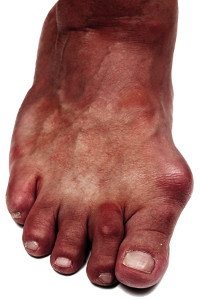 As the winter months are here, you may find yourself switching to winter shoes such as boots. However, it’s important to be mindful that boots are often narrow and can irritate bunions. Bunions are bony protrusions on the side of the feet that develop over time. Narrow shoes such as winter boots can contribute to the progression of this condition, so it’s vital to accommodate your feet with the proper footwear. Opt for wide shoes and look to treatment options such as orthotics, padding, and if the condition is severe, anti-inflammatory medications, injections, or surgery.
As the winter months are here, you may find yourself switching to winter shoes such as boots. However, it’s important to be mindful that boots are often narrow and can irritate bunions. Bunions are bony protrusions on the side of the feet that develop over time. Narrow shoes such as winter boots can contribute to the progression of this condition, so it’s vital to accommodate your feet with the proper footwear. Opt for wide shoes and look to treatment options such as orthotics, padding, and if the condition is severe, anti-inflammatory medications, injections, or surgery.
If you are suffering from bunions, contact the podiatrists of Associated Podiatric Physicians, PA. Our doctors can provide the care you need to keep you pain-free and on your feet.
What Is a Bunion?
A bunion is formed of swollen tissue or an enlargement of boney growth, usually located at the base joint of the toe that connects to the foot. The swelling occurs due to the bones in the big toe shifting inward, which impacts the other toes of the foot. This causes the area around the base of the big toe to become inflamed and painful.
Why Do Bunions Form?
Genetics – Susceptibility to bunions are often hereditary
Stress on the feet – Poorly fitted and uncomfortable footwear that places stress on feet, such as heels, can worsen existing bunions
How Are Bunions Diagnosed?
Doctors often perform two tests – blood tests and x-rays – when trying to diagnose bunions, especially in the early stages of development. Blood tests help determine if the foot pain is being caused by something else, such as arthritis, while x-rays provide a clear picture of your bone structure to your doctor.
How Are Bunions Treated?
- Refrain from wearing heels or similar shoes that cause discomfort
- Select wider shoes that can provide more comfort and reduce pain
- Anti-inflammatory and pain management drugs
- Orthotics or foot inserts
- Surgery
If you have any questions, please feel free to contact our office located in Hamilton Township, NJ. We offer the newest diagnostic and treatment technologies for all your foot care needs.
Read more about BunionsChoosing the Right Winter Footwear for Bunions
 As the winter months are here, you may find yourself switching to winter shoes such as boots. However, it’s important to be mindful that boots are often narrow and can irritate bunions. Bunions are bony protrusions on the side of the feet that develop over time. Narrow shoes such as winter boots can contribute to the progression of this condition, so it’s vital to accommodate your feet with the proper footwear. Opt for wide shoes and look to treatment options such as orthotics, padding, and if the condition is severe, anti-inflammatory medications, injections, or surgery.
As the winter months are here, you may find yourself switching to winter shoes such as boots. However, it’s important to be mindful that boots are often narrow and can irritate bunions. Bunions are bony protrusions on the side of the feet that develop over time. Narrow shoes such as winter boots can contribute to the progression of this condition, so it’s vital to accommodate your feet with the proper footwear. Opt for wide shoes and look to treatment options such as orthotics, padding, and if the condition is severe, anti-inflammatory medications, injections, or surgery.
If you are suffering from bunions, contact Donald Manger, DPM of Associated Podiatric Physicians, PA. Our doctor can provide the care you need to keep you pain-free and on your feet.
What Is a Bunion?
A bunion is formed of swollen tissue or an enlargement of boney growth, usually located at the base joint of the toe that connects to the foot. The swelling occurs due to the bones in the big toe shifting inward, which impacts the other toes of the foot. This causes the area around the base of the big toe to become inflamed and painful.
Why Do Bunions Form?
Genetics – Susceptibility to bunions are often hereditary
Stress on the feet – Poorly fitted and uncomfortable footwear that places stress on feet, such as heels, can worsen existing bunions
How Are Bunions Diagnosed?
Doctors often perform two tests – blood tests and x-rays – when trying to diagnose bunions, especially in the early stages of development. Blood tests help determine if the foot pain is being caused by something else, such as arthritis, while x-rays provide a clear picture of your bone structure to your doctor.
How Are Bunions Treated?
- Refrain from wearing heels or similar shoes that cause discomfort
- Select wider shoes that can provide more comfort and reduce pain
- Anti-inflammatory and pain management drugs
- Orthotics or foot inserts
- Surgery
If you have any questions, please feel free to contact our office located in Hamilton Township, NJ . We offer the newest diagnostic and treatment technologies for all your foot care needs.
